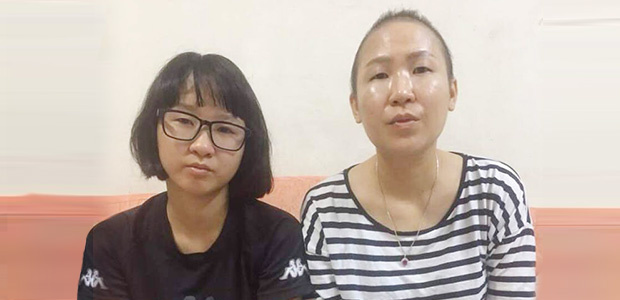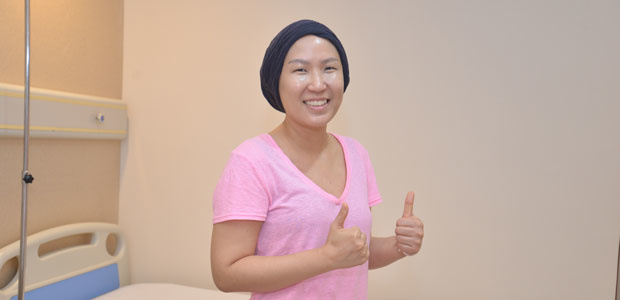In April 2017, WONG SOOK KWAN found a lump in her right breast while taking a bath, but she initially suspected it to be affected by menstrual hormones, so she didn't care very much. She gave herself two months to further observe. In June, she found that the mass did not disappear, and accompanied by breast pain, so she went to the hospital for biopsy. And it turned out to be stage II breast cancer. The doctor in Malaysia recommended her to have breast-conserving surgery and chemotherapy, but she heard that chemotherapy was very painful for cancer patients, she felt worried and scared, so she refused chemotherapy and turned to seek traditional Chinese medicine treatment. However, after 3 months of Chinese medicine, the tumor was not controlled at all, but grew faster and larger. Eventually, it has enlarged into 10 cm, and her breast cancer deteriorates from stage II to stage III.

WONG SOOK KWAN (R), after finishing six courses of chemotherapy in Malaysia
In October 2017, WONG SOOK KWAN began receiving chemotherapy in Malaysia. "It’s really a hard time. Because of chemotherapy, my gums started to swell, accompanied by strong pain, I had no strength, I can't walk, I had a rectal bleeding. And in Malaysia, after chemotherapy, there is no plan or methods arranged for us to alleviate the pain, we patients can only bear it ourselves at home," WONG SOOK KWAN said. After receiving 6 times of chemotherapy, tumors in her breast were significantly reduced, but as soon as she stopped it, the tumor continued to enlarge and later spread to the axillary lymph. So WONG SOOK KWAN tried to find more effective alternative treatments with less side effects.
WONG SOOK KWAN learned about Kuala Lumpur Office of St. Stamford Modern Cancer Hospital Guangzhou from her friends and she went to the office for cancer treatment consultation. At the office, Professor Xu Haitao introduced minimally invasive treatment for her, explaining the differences of procedures and effects between minimally invasive treatments and traditional cancer treatment methods.
WONG SOOK KWAN added, “Professor Xu Haitao told me, drugs are directly given to the tumor via arterial infusion, thus, the drug concentration of interventional therapy is 2-8 times higher than that of systemic chemotherapy. Interventional therapy kills cancer cells more effectively. While systemic chemotherapy drugs are injected via intravenous injection, in other words, drugs will be transmitted to the whole body. Therefore, chemotherapy is of lower drug concentration. And at the same time, it will kills not only cancer cells, but also normal cells, bringing great side effects and cannot effectively control the development of advanced cancers.”

WONG SOOK KWAN in St. Stamford Modern Cancer Hospital Guangzhou after minimally invasive treatment
"I was admitted to the hospital on April 1, 2018. On the second day, the hospital's Multidisciplinary Team (MDT) began to examine my case. The doctors discussed together and explained the next treatment plan carefully for me which made me feel reassuring, I accept the treatment plan and then I started my treatments. I had a modified radical surgery, breast implants, and to prevent cancer cells from recurring, I also had interventional therapy, natural therapy and radiotherapy. My attending doctor Dr. Pan told me that this can reduce the recurrence rate to a minimum and the probability of recurring is only 2%."
“The biggest difference between St. Stamford Modern Cancer Hospital Guangzhou and cancer hospitals in Malaysia is that minimally invasive technology for treating cancer here in St. Stamford Modern Cancer Hospital Guangzhou is more advanced and more effective. In addition, doctors here have a variety of methods to help patients cope with physical discomfort, like side effects. Doctors will make timely adjustments based on the patient's physical response at the first time. However, hospitals in Malaysia have no response to the side effects of chemotherapy. Patients are suffering from nausea, vomiting, and hair loss in silence. When I first came here I was very weak because of previous chemotherapy in Malaysia. Dr. Pan, my current attending doctor, did not arrange anti-cancer treatment for me first. Instead, he first helped me improve my body condition through natural therapy. Dr. Pan told me that only when my body is restored, my resistance and immunity are improved, and later cancer treatment can work better. I trust and thank the doctors here. They are very considerate and careful.
Wong Sook Kwan was diagnosed as stage II breast cancer in June 2017. Before she came to St. Stamford Modern Cancer Hospital Guangzhou, she failed to tolerate the huge side effects of chemotherapy and yielded poor efficacy in Malaysia. After modified radical mastectomy, breast implants, interventional therapy, natural therapy and radiation in Guangzhou, she already had her breast cancer eliminated and gradually got recovery.
*Surgery, in addition to the appropriate chemotherapy and radiotherapy, are effective in treating early cancer, but certain patients in late stage of cancer may not be tolerate surgery well as they can be relatively weak. A combination of carefully planned minimally invasive therapy, chemotherapy or radiotherapy can effectively reduce the side effects and discomfort of treatment and may help patient get better efficacy.













 viber
viber